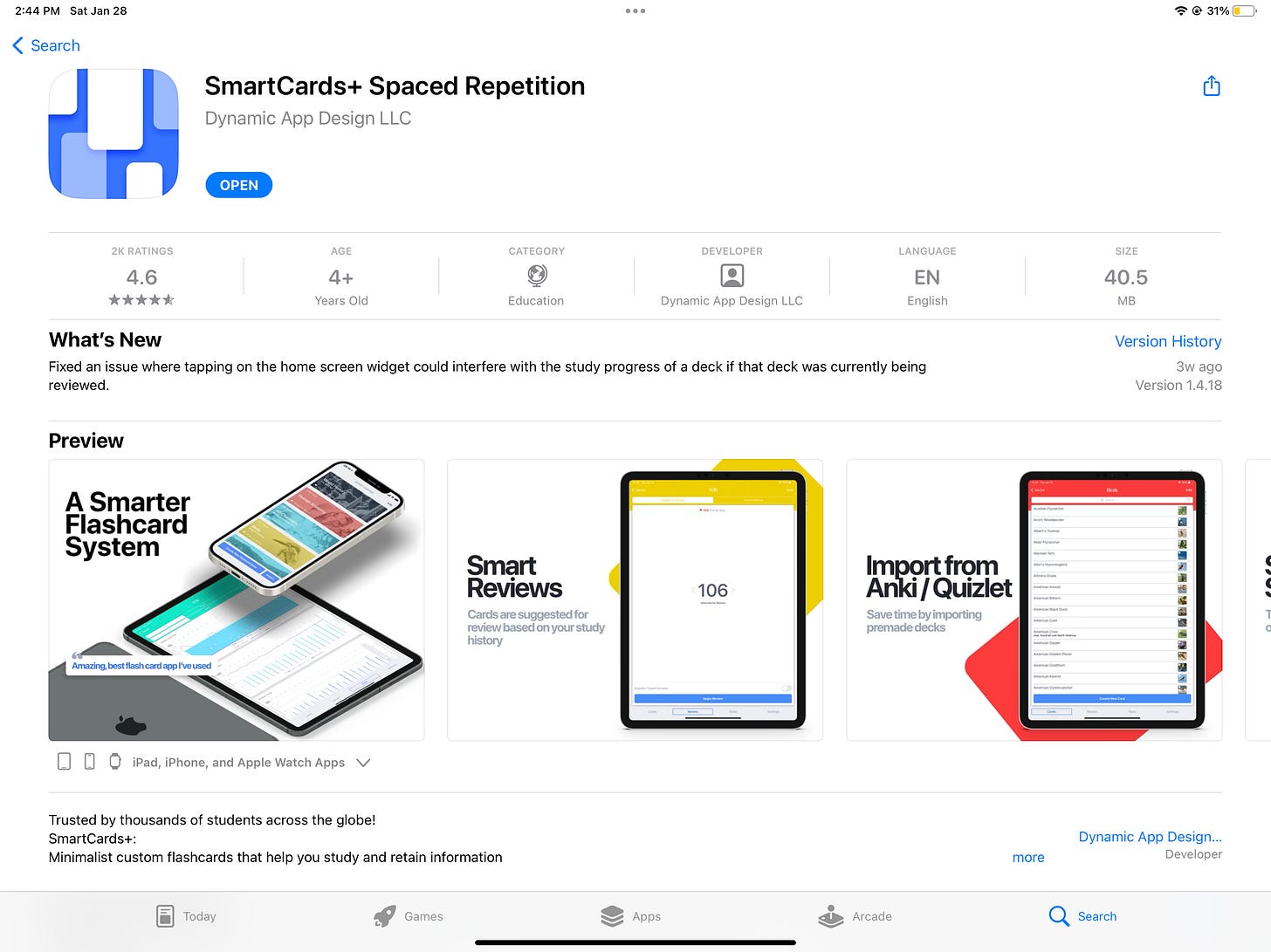How To Memorize Anything (on an iPad)
5 powerful (and free) flashcard apps
I had to memorize 545 facts in one month to earn $6,397 (kind of).
AP Environmental Science is all memorization. That means it's one of the easiest and hardest AP tests (college-level tests for high school students).
Here's what I saw when my results came in July (AP exams are scored out of 5):
The "Secret"
My success comes down to five words: active recall and spaced repetition.
Active Recall
Active recall is a form of studying where you actually use your brain (sorry note-takers).

Whenever you test yourself by recalling info, you're using active recall.
• Taking a practice test? You're using active recall.
• Writing closed-book summaries? You're using active recall.
• Reviewing with flashcards? You're using active recall.
I think you get the point.
Spaced Repetition
If active recall is an iPad, spaced repetition is an Apple Pencil (weird analogy, but hopefully it makes sense).
Spaced repetition makes active recall way more efficient by effectively spacing out active recall. If you know something well, don't study it for a while. If you're struggling with something, study it tonight.
For a better explanation of both concepts, go to YouTube and search "Ali Abdaal active recall and spaced repetition."
How You Can Use These Ideas To Become The Next Spelling Bee Champion

My favorite form of active recall is flashcard apps: it's easy to create flashcards on my iPad and it's easy to study flashcards on my iPhone.
Here are 5 powerful (and free) flashcard apps I've used in the past:
1. SmartCards+
SmartCards+ is the app I used during my 1 month cram session for AP Environmental Science.
It's a free app, syncs across devices, offers spaced repetition, etc. While the app is ad-supported (unless you upgrade), the ads aren't obnoxious.
The only thing that I don't really like is the lack of good organization (unlike a few of the other apps on this list). But while I love sub-folders, I still use SmartCards+ as my main flashcard app.
One key feature I especially love is that you can import Quizlet decks into SmartCards+.
2. Feyn
I used Feyn to study for my AP Calculus exam (I ended up with a 5 on that exam as well).
The unique benefit of Feyn is that it's one of the few handwritten flashcard apps on the App Store.
Feyn does everything well: it syncs across devices, offers spaced repetition, has beautiful organization, etc (there was a period of time where the Feyn iPhone app wasn't working, though that glitch appears to be fixed now).
If you need to memorize math/physics concepts (or basically anything handwritten), use Feyn.
3. Mochi
My active recall and spaced repetition journey started with Mochi.
I loved the app: it's clean, simple, and easy to use. It offered great organization (I love sub-folders), was flexible with media types, and had a couple fun features you probably can't find in any other flashcard app.
The only downside was that you had to upgrade to the pro subscription ($5/month) to sync your flashcards across devices. That was the reason I switched: as a Zoomer, I need to be able to study from my phone.
4. Notion
Notion isn't built to be a flashcard app (though you can use databases to create a fancy flashcard system).
However, there's one key feature that makes it powerful for active recall: the toggle.
The toggle is a semi-flashcard. You can type any question you want and hide the answer inside the toggle.
While it's tough to incorporate spaced repetition with a toggle, Notion makes it easy to share notes with others through a link. This meant I could create and share study guides with my friends, which was important for certain classes.
5. Quizlet
Quizlet is the holy grail of active recall.
I use Quizlet if I need to cram for a test—there are probably billions of flashcards on the platform. This is what most of my friends use when studying, and it's a pretty reliable tool.
Like Notion, it's easy to share Quizlet decks. And that's one of the main reasons why I use the platform.
The only downside is the lack of spaced repetition (though Quizlet used to have it).
A Quick Note
Don't feel limited to just these apps.
There are probably thousands of active recall and spaced repetition apps out there, and there are plenty of good ones I haven't tried yet (at the moment, I'm testing out RemNote).
Explore the internet and find a tool that works for you.
Final Thoughts
"The only place where success comes before work is in the dictionary"—Vidal Sassoon
Thanks for reading!
Adi








